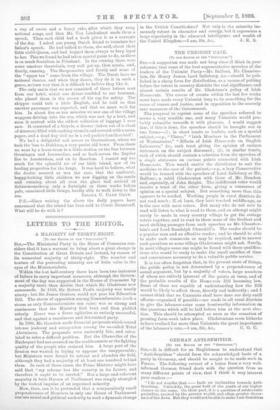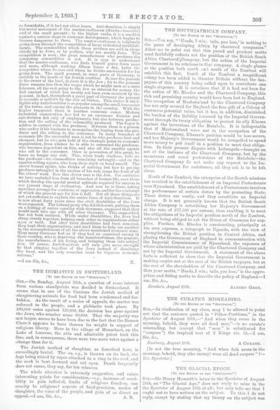GERMAN ANTI-SEMITISM.
[To THE EDITOR OF THE "SPECTATOR,")
SIEs—It is difficult for an Englishman to understand that "Anti-Semitism" should form the acknowledged basis of a party in Germany, and should be sought to be made such in France. The following extract of a latter from a very well-. informed German friend deals with the question from so many different points of view, that I think. it may interest your readers :— " I do not wonder that — feels an inclination towards Anti- Semitism, Unluckily, the great bulk of the youth of our higher. classes do the same. On their part, it is a question of aristocratic prejudice, excited by the greater wealth and often greater clever-- neis of the Jews. But they would not be able to make Anti-Semitism so formidable, if it had not other bases. Anti-Semitism is simply the social movement of the master-craftsman (Handwerksmeister) and of the small peasant ; in the higher ranks, it is a reaction 'against a certain stage in economic development, which begins to become dangerous to them. The master-craftsman is helplessly going down through the competition of large industrial establish- anents. The commodities which these produce are sold in shops chiefly let to Jews, or by pedlers, who are mostly Jews. This competition is seen ; the great manufacturer who produces the competing commodities is not It is easy to understand that the master-craftsman, who finds himself going down more and more, although working fifteen hours a day, hates the competitor whom be sees and whom he thinks answerable for his going down. The small peasant, in some parts of Germany, is -entirely in the hands of his Jewish creditor. De jure the peasant is the owner of the land, de facto it is the Jew ; for to the peasant there remains loss than the wages which he might earn as a mere labourer, all the rest going to the Jew as interest for money, the full amount of which has mostly not been oven received by the peasant. In fact, throughout a great part of Germany the peasant is corveable et taillable by the Jew ad Libitum. This makes it intel- ligible why Anti-Semitism is so popular among the small bourgeoisie of the towns, and among the peasants in the country. With the higher bourgeoisie there is another economic cause. Modern :industrial organisation has led to an enormous division and :sub-division not only of employments, but also between produc- tion and the selling of the commodity produced. The buyer is seldom in contact with the producer. Between them is a person who makes it his business to monopolise the buying from the pro- ducer and the selling to the consumer. In many branches of economic life the successful man is not he who produces best and cheapest, but he who gets hold of the strategic point in economic ,organisation, from whence he is able to command the producer, who becomes dependent on him, and also all the smaller agents who sell to the consumer. Once in possession of this point, he bears no longer any risk. This, when trade slackens, falls on the producer—his commodities remaining unbought—and on the :smaller selling agents, who keep their stock on hand unsold. The clever human spider, who thinks of nothing but how to get the producer entangled in the meshes of his web, reaps the fruit of all the others' work. Now this clever man is the Jew. For centuries we have excluded him from all branches of human life, save those which develop the special mental aptitude required for success in -our present stage of civilisation. And now he is there, taking merciless revenge for centuries of oppression, and for the contempt of which the present age for him is full. But all these things are not yet sufficient to explain the entire force of Anti-Semitism. It is now about forty years since the civil disabilities of the Jews were repealed. The Liberal party who did this work, putting them on a footing of entire cquality with Germans, supposed that they would melt into one with all other Germans. This supposition
has not been realised. While under disabilities, the Jews bad clung closely together, helping each other in organisations either .-o?en or tacit. But after their disabilities had been removed, they kept their organisations, and used them to help one another' in the accomplishment of all the above-mentioned economic aims.
Thus many Germans feel as if they had an organised enemy in their country, who is depriving the handicraftsman, the peasant: the manufacturer, of his living, and bringing them into subjec; tion. Of course, Anti-Semitism will only give more strength -to that clinging together of the Jews instead of dissolving .the baud, and the only remedies must be vigorous economic reforms."



































 Previous page
Previous page